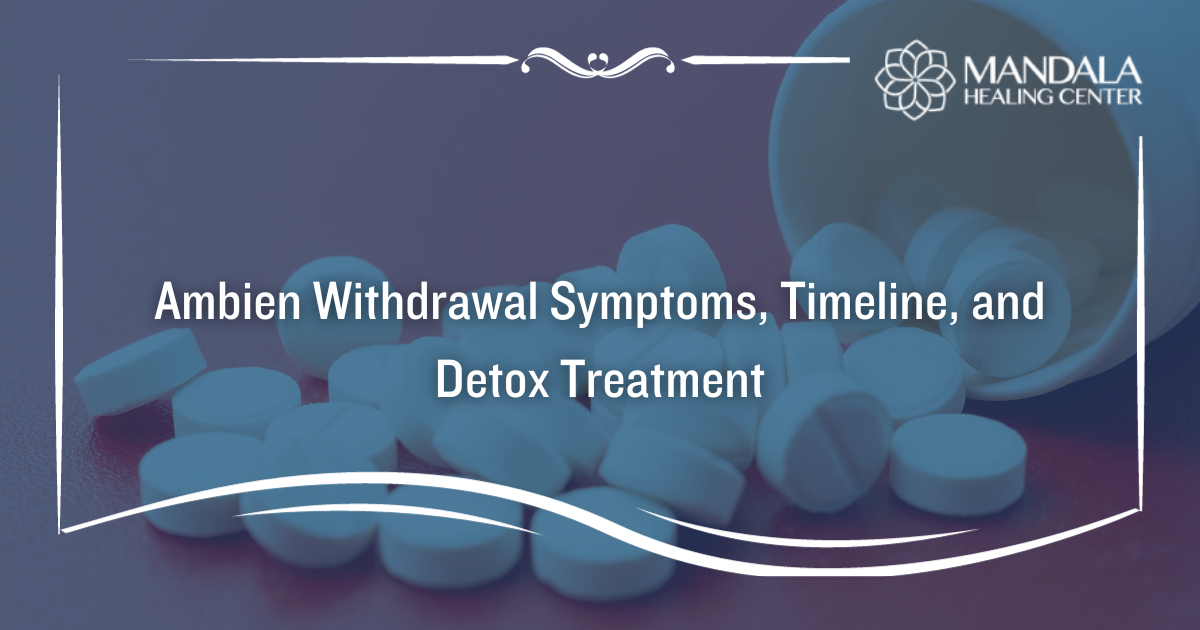Insomnia is a common sleep disorder that causes people to have a hard time falling or staying asleep. According to the CDC, 14.5% of adults in 2020 had difficulty sleeping most days out of the month.[1]
Sleep is extremely important for one’s ability to function in their daily life, so people dealing with insomnia often take medication to help them sleep. One of the most common insomnia treatment medications is Ambien (zolpidem). While this substance can be extremely effective in helping people get sleep, it can be habit-forming and addictive.
People who suddenly stop taking Ambien after periods of regular use may experience mild to moderate withdrawal symptoms as their bodies adjust to the absence of Ambien. The Ambien withdrawal timeline can vary from one person to the next, but it usually lasts for 1-2 weeks.
What are the Ambien Withdrawal Symptoms?
If you have been taking Ambien for a long time or began misusing the medication, your body might begin to rely on it to function properly. When this happens, suddenly stopping the use of the substance will result in withdrawal symptoms. Experiencing withdrawal symptoms means you are dependent or addicted to Ambien.
The withdrawal symptoms associated with Ambien include:[2]
- Heightened body temperature
- Excessive sweating
- Racing heart rate
- Inability to sleep
- Nausea and vomiting
- Anxiety or panic
- Agitation or irritability
- Depression
- Shakiness and tremors
- Stomach aches or cramping
- Cravings to use Ambien
While Ambien withdrawal symptoms are usually not life-threatening, they can be extremely difficult to cope with, leading many people to relapse.
Relapsing on Ambien after a period of abstinence can increase your risk of overdosing, especially if you attempt to use a high dose you used to be tolerant of. As a result, you should always seek help from a professional Ambien detox center instead of trying to quit by yourself.
The Ambien Withdrawal Timeline
Being addicted to Ambien can be incredibly difficult, especially if you were originally using it to control your insomnia. Once you stop using Ambien, you may experience a rebound of symptoms, meaning you will have a hard time sleeping while your body is adjusting to the absence of Ambien.
An estimated timeline for Ambien withdrawal is as follows:
6 to 8 Hours
You may begin noticing mild withdrawal symptoms 6 to 8 hours after your last dose of Ambien. The initial symptoms are usually tolerable and may include an inability to fall asleep, anxiety, or feeling hot.
24 to 28 Hours
Sometime between 24 to 48 hours after your last dose of Ambien, your symptoms will begin to peak, meaning they will be at their most severe. You might experience excessive sweating, increased body temperature, insomnia, panic attacks, and even stomach pains.
During this time, you must receive medical treatment from a detox facility to prevent you from relapsing.
4 to 5 Days
Generally, the symptoms of Ambien withdrawal will begin to lessen in severity sometime between the 4th and 5th day of detox. While the physical symptoms usually go away at this point, you could continue to experience psychological effects like depression, anxiety, and insomnia.
1 to 2 Weeks
Sometime between 1 to 2 weeks after your last dose of Ambien, your withdrawal symptoms will subside. This is usually when the withdrawal timeline is completely over. However, you could develop post-acute withdrawal syndrome (PAWS), which causes you to experience psychological symptoms of withdrawal for an extended period.
How is Ambien Withdrawal Treated?
If you or a loved one suffers from Ambien addiction, it’s crucial to seek help from a trusted drug and alcohol detox center near you.
Upon arrival at an Ambien detox center, you will be assessed to determine your specific needs during detox and addiction treatment. The information gathered during this assessment will help the medical staff create an individualized treatment plan.
After your treatment plan is created, you will begin detoxing off of Ambien. Your vital signs and overall health will be monitored on a 24/7 basis to ensure you are safe and comfortable throughout the entire process.
Oftentimes, medications are used to limit the symptoms of Ambien withdrawal. You will either be given symptom-specific medications or use the tapering method to slowly titrate your dose of Ambien down until you no longer need it. Both of these methods ensure that your withdrawal symptoms do not become severe, helping you successfully overcome physical dependency.
After you are successfully detoxed off of Ambien, you will transition into further treatment. This could involve inpatient or outpatient rehab depending on your personal needs.
Finding Help for Ambien Abuse and Addiction
If you or a loved one suffers from Ambien addiction, it’s time to seek help. Being addicted to this substance can increase your likelihood of dealing with severe insomnia as well as other physical and mental health problems. By attending a drug rehab program, you can learn how to manage your insomnia without abusing medications like Ambien.
To learn more about how we can help you overcome Ambien addiction with our prescription drug addiction treatment programs, please contact Mandala Healing Center today.
References:
- The Centers for Disease Control and Prevention (CDC): Sleep Difficulties in Adults: United States, 2020, Retrieved September 2023 From https://www.cdc.gov/nchs/products/databriefs/db436.htm
- The National Library of Medicine (NLM): Zolpidem dependence, abuse and withdrawal, Retrieved September 2023 From https://www.ncbi.nlm.nih.gov/pmc/articles/PMC3906775/
- Semel Institute for Neuroscience and Human Behavior (UCLA): Post-Acute Withdrawal Syndrome (PAWS), Retrieved September 2023 From https://www.semel.ucla.edu/dual-diagnosis-program/News_and_Resources/PAWS












